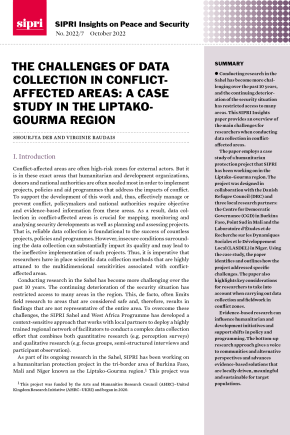The Challenges of Data Collection in Conflict-affected Areas: A Case Study in the Liptako-Gourma Region
Conducting research in the Sahel has become more challenging over the past 10 years, and the continuing deterioration of the security situation has restricted access to many areas. This SIPRI Insights paper provides an overview of the main challenges for researchers when conducting data collection in conflict-affected areas.
The paper employs a case study of a humanitarian protection project that SIPRI has been working on in the Liptako-Gourma region. The project was designed in collaboration with the Danish Refugee Council (DRC) and three local research partners: the Centre for Democratic Governance (CGD) in Burkina Faso, Point Sud in Mali and the Laboratoire d’Études et de Recherche sur les Dynamiques Sociales et le Développement Local (LASDEL) in Niger. Using the case study, the paper identifies and outlines how the project addressed specific challenges. The paper also highlights key considerations for researchers to take into account when carrying out data collection and fieldwork in conflict zones.
Evidence-based research can influence humanitarian and development initiatives and support shifts in policy and programming. The bottom-up research approach gives a voice to communities and alternative perspectives and advances evidence-based solutions that are locally driven, meaningful and sustainable for target populations.
I. Introduction
II. The challenge of designing a representative sample
III. The challenge of collecting data according to the sample
IV. The challenge of forming an effective data collection team
V. The challenge of protecting researchers and respondents
VI. Conclusions


